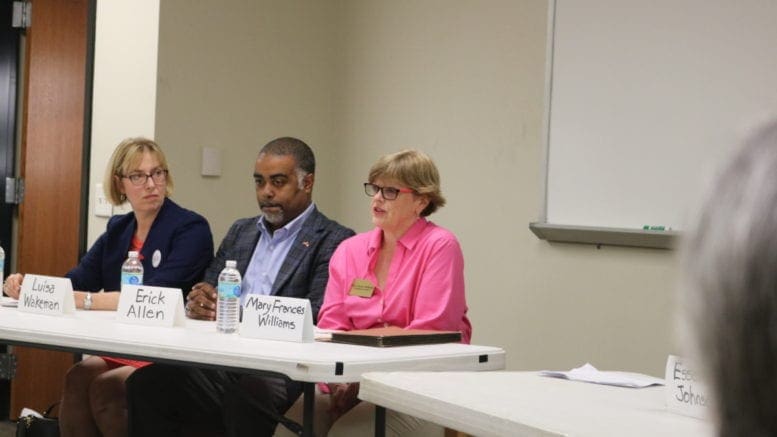Rep. Mary Frances Williams (D-Marietta) introduced House Resolution 257 Tuesday regarding coal ash contamination in Cobb County. Coal ash is produced by burning coal in coal-fired power plants.
Due to a 2015 EPA regulation, utilities are now required to publicly report groundwater monitoring data. Earthjustice and the Environmental Integrity Project went through thousands of pages of data, posted by Georgia Power, that they described as “very difficult to understand” and “required technical and legal analysis.”
The conservation groups’ published report stated that there was groundwater contamination at 11 of 12 coal plants. Ten of the 11 had unsafe levels of pollutants, including arsenic, radium and lithium.
Georgia Power currently has plans to completely remove some of the state’s coal ash ponds closest to water and cap others in place as they move from wet handling methods to dry. Environmentalists, like Jenifer Hilburn, executive director of Altamaha Riverkeeper, say this does not go far enough as the ash in the closed ponds can continue to come into contact with groundwater.
The contamination report raises concerns about unlined ash ponds and recommends “coal ash disposal in lined, engineered landfills sufficiently distant from groundwater and surface water to prevent adverse effects.”
Rep. Williams, who is a member of the Natural Resources and Environment Committee, heard presentations from Georgia Power, Oglethorpe Power, MEAG and the Environmental Protection Division last week regarding plans for the coal ash pond closures. Her resolution urges “Georgia Power to remove all buried and unburied coal ash piles from Plant McDonough and place it in a lined landfill,” according to a press release.
Plant McDonough is located near Smyrna on the banks of the Chattahoochee River.
“I was shocked to learn that there is 6.3 million tons of coal ash at a power plant in Cobb County,” Williams said. “Given the plant’s proximity to the Chattahoochee River, I was astonished and upset to learn about plans for the handling of the coal ash. This is dangerous stuff.”
According to the environmental report, multiple wells at Plant McDonough have unsafe levels of arsenic, beryllium, boron, cobalt, lithium, radium, selenium and/or sulfate. Georgia Power’s current plans are to consolidate and close the unlined ponds in place.
“We’re only asking that safer methods used at other power plants in Georgia be used here in Cobb County. Coal ash from other plants in Georgia is being removed and put into lined pits, and Cobb County’s citizens deserve the same protection. Further, the citizens in Cobb County, and those in communities downstream the Chattahoochee from us, deserve safe, uncontaminated water,” Williams said.
Chris Manganiello, water policy director of Chattahoochee Riverkeeper, responded to William’s announcement saying, “Chattahoochee Riverkeeper is thankful for Rep. Williams’ resolution and attention to this issue. Georgia Power’s groundwater monitoring at Plant McDonough has revealed coal ash has contaminated groundwater. That could lead to contamination of the Chattahoochee River. Because of this risk, Chattahoochee Riverkeeper has always advocated for coal ash to be stored in a dry condition, in lined landfills, and out of contact with groundwater and surface water.”
In response to a request for comment, Georgia Power spokesperson Holly Crawford provided the Courier with the following written statement:
Since 2016, Georgia Power has installed approximately 500 groundwater monitoring wells around its ash ponds and on-site landfills to actively monitor groundwater quality. Monitoring is being conducted in compliance with federal and state laws and regulations. The company has also engaged independent, third-party contractors for sampling and accredited independent laboratories for analysis. The first round of testing was completed with results published in August 2016, more than 18 months ahead of federal requirements, and the company continues to post testing results on Georgia Power’s website and report them to Georgia EPD. Based on the extensive data collected, the company has identified no risk to public health or drinking water.

